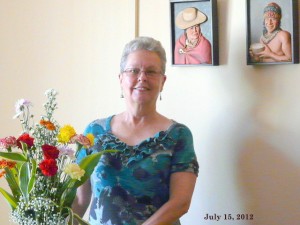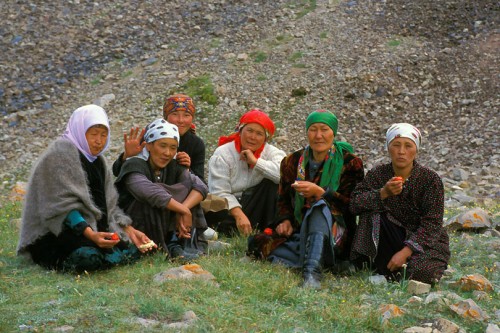My guest this week is Nancy Gregory, whom I met on the We Love Memoirs Facebook group I’ve mentioned before. Nancy, who now lives in Ecuador, is a returned Peace Corps volunteer (RPCV in keeping with PC practice of using acronyms as often as possible).
First, her bio:

Nancy Gregory was raised on a farm in West Texas. Growing up, her family rarely traveled and never traveled outside the U.S. She now makes her home in Ecuador and wonders if it was the subscription to National Geographic in her youth that planted the travel bug seed?
Nancy followed the expected route of a young woman in the 1960s: attended a university (but didn’t complete her B.A. until many years later), married (divorced after 13 years), moved (to California, her first culture shock), and had two children.
After the divorce and with the children grown, she saw a poster advertising, “Peace Corps, No Upper Age Limit.” She was 54 when she applied to the Peace Corps, was accepted and was placed in Kyrgyzstan, Central Asia. (She had to look at an atlas to know where she was going.)
Her original 27 month commitment expanded to 3 years, years that changed her life and expanded her world. She has lived in Cuenca, Ecuador for three years, loves being retired and being able to travel. She finds Cuenca an exciting city, giving her many opportunities to learn about South American culture.
You can reach her at the following links:
On her blog: Nancy’s Retirement Adventures
Facebook: Nancy Gregory, Cuenca Ecuador
+ email: gregoryinecuador@gmail.com
Here’s her story, “Nancy’s Midlife Adventure”
Growing up in rural Texas in the 40s, 50s and 60s, I was not aware of the term “cultural differences” even though I was experiencing differences between whites and blacks (and others). Those differences were not labeled in either my family or my community. It was just the way things were, and I never questioned the mores of the times.
My first culture shock was moving from Texas to California at age 20. Everybody on the west coast seemed much more open to all people, lifestyles, religions, etc. I lived many years in California and New Mexico and learned to be more nonjudgmental and open to various lifestyles.
In 1997 I was living in New Mexico when I applied to and was accepted into the Peace Corps. With three years of PC service in Kyrgyzstan, Central Asia, my love of travel and my eagerness to know about additional cultures were ignited. I entered my service with an openness to learn and a willingness for my beliefs to be challenged. As various Kyrgyz situations presented themselves, many times I asked (or thought to myself) WHY? Instead of being judgmental, I realized all cultures are different, not right or wrong.

While reading Janet Givens’ book, At Home on the Kazakh Steppe: A Peace Corps Memoir, I learned of similar situations in Kazakhstan.
The Kyrgyz women in the NGO (non-governmental organization) where I worked (and others) opened their hearts and minds to me and I felt welcome in their work places and communities. They were just as curious about North Americans and our customs as I was about the Kyrgyz culture.
Sometimes (especially in the beginning months when I lived with a Kyrgyz family), I felt my privacy was invaded and it was difficult to accept. Later when I lived alone, I could chose when I wanted to open the door of my apartment to others. As far as I know, I was the only person in my village who lived alone and the local women could not understand why this was my preference.
During the years that I served (1997-2000) I had no social networking gadgets—no computer, no TV, and no cell phone. When I was by myself in the evenings, there were some household chores to do (like sifting the stones from the rice) and, for leisure, I wrote letters by hand, played solitaire, and read, sometimes by candlelight.

I believe a misconception of North Americans is that people who are living simpler lives with less stuff than we have are unhappy. I did not find that to be true. Yes, life is more difficult, but families/friends are working together, helping each other, building strong communities and finding joy in their lives.
In communities where I visited and worked, the families love their children and are doing the best they can for them. Children find joy in playing with each other. Simple games like ‘jump the ditch’ and rolling a rim of a wheel were popular.

A huge difference from North America is the high regard these communities show for the roles that each person is assigned in the family and especially the respect for the elderly. As a woman in my late 50s, I was respected, asked to share the wisdom I had learned during my life, and treated as an honored elder.

Yes, there were challenges for me that included learning the Russian and Kyrgyz languages. Like many North Americans, I had never studied another language — that’s insufficient education as far as I am concerned. The Kyrgyz schools started teaching English or German in the second grade!
Having lived in New Mexico, the climate was difficult for me. It was very cold with no heating in the building where I worked and concrete floors. My toes were so cold, that I would walk home at lunch to warm my feet with the heater that the Peace Corps provided.
I returned to U.S. and lived in Southern California for eleven years until I retired in 2011. During those eleven years, I was always uncomfortable with the excess of things and the lack of respect for family and the elderly, etc. in the U.S.
Going to the grocery store challenges most Returned Peace Corps Volunteers; having so many choices overwhelms us. And now I ask of the North American society, WHY? Until I lived outside the U.S., I didn’t recognize the many ways excess is included in our lives. Most of us were accustomed at our sites to having one choice for bread, for example.
I didn’t make any plans to live outside the U.S. until my retirement was on the horizon. With the thought, “I can live anywhere that I want,” new places/ideas occured to me.

Ecuador offered many advantages: inexpensive cost of living, a growing economy, moderate weather, easier requirements than most countries to gain residency, access to fresh fruits and vegetables, good health care (I would have returned to Kyrgyzstan if they offered good health care), and easy accessibility to fly to the U.S.
After experiencing Ecuador for three years, I find positive similarities with Kyrgyzstan:
- the importance of family and the role of each family member,
- respect for the elderly, and
- the hospitality of the locals.
The challenges are differences in the concepts of privacy and the lack of adherence to time for appointments and schedules.
The last item is one of my challenges. That cultural difference of time is just not important in Kyrgyzstan or Ecuador. I completely honor that the family is a priority and circumstances must be changed when someone is needed for a family event. My request is that I be notified of change of plans.
That was difficult in Kyrgyzstan because of no phones, but in Ecuador, everyone I know has a cell phone and I still don’t get notified of changes.
In my opinion, the most important attributes that are required of people who travel and/or live in different cultures are acceptance of differences, patience, and flexibility.
I have my residency for Ecuador and I love living in Cuenca. The benefits totally outweigh the small challenges.
Thank you Nancy, for sharing a bit of your Peace Corps adventure and your current life in Ecuador. I understand you’ll be touring Southeast Asia this year. I hope you’ll come back next year and share a bit of that experience with us.
How about you? What might you struggle with most if you lived in a foreign culture?
Janet Givens
Nancy, thanks so much for sharing your story. I loved how you included your move from Texas to California in among your different culture shocks. I felt that too when I moved from NYC to The Midwest, also in my early 20s. The pace was slower, the perception of what was risky much more conservative. It’s striking to me how we maneuver through those changes: how we choose to fit in or stand out. And I also appreciate the pictures you chose. Very colorful. Thanks.
Nancy
Janet, thanks for your comment. Through all the changes and travels, I have had/have the privilege of having choices. Many people don’t have this privilege; they feel stuck because of their circumstances. I am grateful to have all these wonderful experiences.
KM Huber
What an interesting post, and your memoir also sounds fascinating. Having read and thoroughly Janet’s book, your post reminded me of certain cultural aspects that she also found. Mostly, I am convinced that Americans really do need to experience other cultures, and I include myself in this sentence. But as that is not likely for many, perhaps we can turn our gaze inward and do more for the planet and less for ourselves. Enjoyed the post very much. Thank you.
Karen
Nancy
Karen, Thanks for your comments and insights. It is my belief that Study Abroad must be a requirement in the U.S. Many of the universities have these programs and I hope every student has the opportunity to take advantage of going abroad or my favorite volunteer corps–the Peace Corps. And as you read, these opportunities are not limited to young people. I encourage everyone to explore the world.
Janet Givens
Thanks for joining us, Karen. Always good to have your take.
Marian Beaman
Janet, it’s interesting how you and Nancy have come to similar conclusions about adaptations to different cultures. I admire you both for stepping out of your comfort zone which I did as a young girl leaving my Mennonite culture.
Later my husband and I traveled to experience other cultures, particularly in western European countries. My eyes were opened to the arrogance and complacency of many Americans at that time and also when we visited Ukraine a few years ago volunteering for a charity fund there. Best wishes to you both as you continue to expand our world and explore your own in these posts.
Nancy Gregory
Marian, Thanks for your comments. It sounds like you made important decisions regarding your life early in your life; I was a late bloomer. It’s a challenge to do all I want to do now…it’s a big, wonderful world that offers us so many things to do and see.
Janet Givens
Marian, I can’t wait for your own memoir to come out.
Marian Beaman
Thanks for your vote of confidence. Right now I’m doing memoir-ish blog posts. I start tearing into the first draft in January.
You know the drill so well. How fortunate I am to have so many well-placed “bread crumbs” to follow.
Looking Behind So I Can See Ahead More Clearly |
[…] Nancy Gregory […]